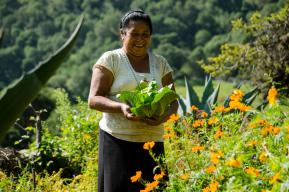News
Youth Fah Peace Teaches Life Skills to Jamaican Students

Violence in schools has been a continuous threat to students in Jamaica, hindering both their safety and opportunities to receive quality education. Under the SALIENT (Saving Lives Entity) Initiative in Jamaica, UNESCO, together with the Ministry of Education, Youth and Information, designed a training to empower young people to peacefully manage conflicts at personal and community level.
From 27 to 28 September, the “Youth Fah Peace: Life Skills Training for Students” was conducted for students from Denham Town High School. Mr. Richard Troupe, Director of Safety and Security in Schools` Unit, Ministry of Education, Youth and Information, visited the training and emphasized to the students how the skills obtained through this training can change their lives, their school, and their community.
Empowering Youth to Become Agents of Positive Change
The students discussed the main causes of conflict and engaged in activities to cultivate their capacities for critical thinking, conflict management and learned peace strategies. The methodology was participatory and interactive, including the use of sports, and the creative arts to foster youth empowerment. Through group team-building exercises, the students were provided with tools for handling conflict from socio-emotional principles such as compassion, mutual understanding and empathy. The sessions did not solely rely on delivering information to the students, but also motivated the youth to act out their ideas and transform their goals into songs and poems. These cooperative learning exercises enabled students to actively interact with others and intervene in conflict situations. The design of the training was delivered through non-formal learning methods grounded on the Global Citizenship Education approach which aims to empower learners of all ages to assume active roles, both locally and globally, in building more peaceful, inclusive and secure societies.

I learned that no matter how hard the situation is, there is always a solution. I want to change others and I want to help reduce conflict. Let’s start over
Addressing Gender Stereotypes and Building Peace
The training also aimed at strengthening the understanding of the basic notions of gender norms and stereotypes, and the potential impact they could have within the community. The students obtained guidance to tackle harmful gender norms and stereotypes, especially in cases where they can lead to violence.
It is important for students to learn how to recognize stereotypes that exist in their everyday lives, and for them to be aware that this can lead to unequal or unfair treatment.
24 students received certificates for successfully completing the training. Most of the youth participants said they felt confident in approaching conflict through management strategies and suggested various ideas of how to implement their learnings in their schools and communities. The training was grounded in a sound analysis of already existing work including the recommendations of youth who were consulted for the Youth, Peace and Security Case Study for Jamaica. This pilot programme will also be adapted to a training scheduled for students from St. James High School in Montego Bay.
Within the SALIENT Initiative, UNESCO trained 79 educators on implementing peace-building strategies and techniques in classroom management earlier this year.
UNESCO in the Caribbean promotes a positive narrative of youth as change-makers and peacebuilders. In the spirit of the Sustainable Development Goal 16 on Peace, Justice and Strong Institutions, UNESCO fosters a culture of non-violence, resilience and peace, through mutual understanding and intercultural dialogue in Caribbean Small Island Developing States (SIDS). In this light, UNESCO advocates for a multi-stakeholder approach involving policymakers, researchers, youth and other actors.









